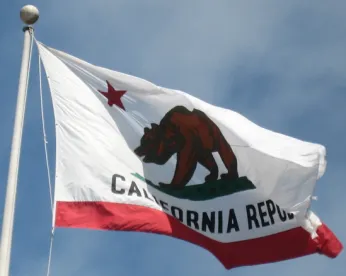On Monday, the State of California launched a new group out of Governor Newsom’s office – the Climate-Related Risk Disclosure Advisory Group just as CERES (Coalition for Environmentally Responsible Economies), a non-profit organization that has been a significant voice over the past decade on climate and sustainability economic issues, issued a report entitled, Turning Up the Heat, The need for urgent action by U.S. financial regulators in addressing climate risk.
The California advisory group is led jointly from the governor’s office and the Stanford University Precourt Institutes Sustainable Finance Initiative. It is comprised of representatives from state government, various finance and energy finance institutions, venture capitalists, academics, and consultants. The Governor’s Office of Planning and Research, which is organizing the effort, is described as the comprehensive planning agency that studies future research and planning needs, fosters goal-driven collaboration, and delivers guidance to state partners and local communities, with a focus on land use and community development, climate risk and resilience, and “high road” economic development. One member of the group is the CEO of the Sustainable Accounting Standards Board while another is a former California Insurance Commissioner, who played a central role in mandating climate disclosure in the insurance industry.
The formation of this group is consistent with the view that several have advanced that will move forward with issuing a climate reporting standard, as foreshadowed by recent bills introduced in the legislature, such as the Climate Corporation Accountability Act. The Act would require the California Air Resources Board to develop and adopt regulations within a year that requires U.S.-based partnerships, corporations, limited liability companies, and other business entities with total annual revenues in excess of a billion dollars and that do business in California to publicly disclose their Scope 1, 2, and 3 greenhouse gas emissions. The bill seeks to have reports be available electronically and would require it to be easily understandable and accessible to state residents. It states that its purpose is to inform policymaking, empower the public, and activate the private sector to drive corporate GHG emissions reductions.
Another bill, SB449, introduced by Senator Stern on February 16, 2021, would require certain financial entities to prepare, submit, and make publicly available annual climate-related financial risk reports and would establish an advisory Climate Change Financial Risk Task Force to assess climate-related financial risk facing investors, corporations, banks, credit unions, mortgage lenders, insurers, and the state. The task force would (1) collect and review climate-related financial risk reports; (2) annually prepare a public report that contains disclosure of climate-related financial risk contained in climate-related financial risk reports; analysis of the systemic and sector-wide climate-related financial risks facing the state based on the contents of climate-related financial risk reports; identification of inadequate or insufficient reports; proposals for regulatory actions, policies, or reforms needed to mitigate climate-related financial risks, including, but not limited to, legislative recommendations in order to implement current best practices regarding the disclosure of financial risks resulting from climate change.
The new CERES report recommends a series of what it calls foundational steps that federal financial regulators should put in place to activate climate change across their mandate, indicating CERES’ perspective that there is a lack of urgency while climate impacts on financial markets are growing. The report calls on U.S. financial regulators to (1) immediately affirm the systemic nature of the climate crisis and impacts on financial market stability; (2) activate action on climate-related measures, including prudential supervision, investor protections, and enhanced climate disclosure mandates; (3) pursue holistic approaches, including considering climate impacts in addressing the pandemic and addressing systemic racism and the climate crisis as interrelated stability risks; (4) build capacity for smart decision-making on climate change by coordinating action with other U.S. financial regulators, global peers and other external stakeholders and by hiring and training staff.
In terms of holistic approaches, CERES recommends that financial regulators engage external stakeholders to deepen their understanding on how climate change impacts their area of focus, citing to among others, the U.S. Securities and Exchange Commission’s Asset Management Advisory Committee setting up an Environmental, Social, and Governance subcommittee focused on ESG issues, including climate change and climate disclosure, for the purpose of enhancing transparency for investors and calls on financial regulators to consider partnerships with agencies like EPA, NOAA, FEMA, and others. Separately, the SEC has also begun renewed actions to scrutinize public company filings with respect to climate change disclosures under the SEC’s 2010 guidance to public companies on climate issues and existing disclosure requirements. On February 24, the SEC’s current acting Chair, Allison Herren Lee, issued a directive to the SEC’s Division of Corporation Finance to “enhance its focus on climate-related disclosures in public company filings” and review the extent to which public companies: (1) address the topics in the 2010 guidance; (2) assess compliance with disclosure obligations under the federal securities laws; (3) engage with public companies on these issues; and (4) absorb critical lessons on how the market is currently managing climate-related risks. All of this is indicative of the key role that climate change professionals will play as companies address disclosures if they are mandated, as the importance of “apples-to-apples” comparisons and the potential liabilities associated with disclosures will require careful analysis.
The new CERES report builds on another from last June, Addressing Climate as a Systemic Risk: A Call to Action for U.S. Financial Regulators. which laid out CERES explanations for why climate change threatens the stability of financial markets and the overall economy, and how and why it believes that U.S. financial regulators must address this systemic risk as part of their existing responsibilities.








 />i
/>i

